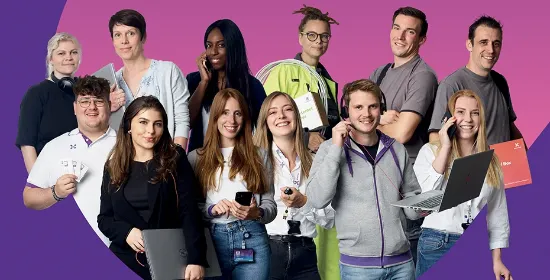YODA: the chatbot bringing Proximus HR closer to its employees

Robbert Menten is HR Communication Manager at Proximus and among others co-responsible for the YODA HR-chatbot project. In this article, he makes the case for pioneering technological innovations, without losing sight of the value of human experience.
Robbert Menten
My LinkedIn profile
At Proximus, we constantly strive to improve the employee experience. One piece of that puzzle is ensuring our HR department is easily reachable for answers to questions. Our solution to that challenge is a good illustration of how humans and Artificial Intelligence (AI) can work side by side to achieve the best results. Let me share some of this journey with you today.
Our HR department services over 9,000 employees in hugely varied positions and contracts. Inevitably, those 9,000 employees have questions that they need answers to and dealing with such a high volume of questions is challenging. The traditional process would be to have either a direct phone line, or an online ticket system with HR colleagues treating case by case.
Both options are highly inefficient: Employees risk either being on hold for ages or having to wait several days to get an answer. From an HR standpoint, having to answer the same questions dozens of times each day can lead to frustration and takes up valuable time that could be used for more intricate work. Our alternative? Ask YODA, our HR chatbot.
Creating time on both ends
YODA at Proximus is a conversational AI-powered chatbot that can answer straightforward employee questions immediately. Thus making our HR department more easily approachable and increasing its availability. Admittedly, at first glance this may sound strange. Replacing direct personal contact by a conversation with a computer program might not seem like the most effective way to humanise your HR department. But upon closer inspection, it works: YODA does bring Proximus HR from its perceived ivory tower closer to the people!
Why? Because by letting YODA handle the simple questions, our HR colleagues gain more time for the more complex interpersonal conversations that really require their domain expertise and the human touch: Such as career planning, remuneration, complex leave arrangements, … this is where HR professionals offer the most value, pursue their passion for people and therefore, where they should be spending the majority of their time. Thanks to YODA, they can at Proximus.
This asynchronous but quick way of working also saves employees lots of time: they can ask YODA a question without interrupting their workflow. And if YODA can't answer a question twice in a row, it switches the user to a live chat with an HR person. Since this only happens in about 9 % percent of cases, we seem to have struck the right balance between making HR reachable and finding smart ways to answer the most common questions.
Innovation: the product of continuous improvement
We are proud of what we are achieving with YODA today: Our HR chatbot can accurately answer over 700 items, and it saves our HR professionals an estimated 41 workdays each month. Don't get me wrong, though: getting to this point took a while and our YODA is far from perfect. For example, while the user satisfaction rate has been increasing over the past years, it's still only slightly above 50 %. That's something we're working to improve in several ways.
A big next step for YODA will be to implement 'generative AI', where new content is generated in response to user prompts and powered by models trained on big data to recognize and mimic human behaviour patterns, in Q&A for example. Currently, YODA only uses AI to correctly interpret differently phrased questions and to connect them with the right answer. The answers themselves were created manually by HR colleagues. The challenge with implementing generative AI will be to make sure YODA does not come up with incorrect answers. In other words, the chatbot needs to recognise when it doesn't know the correct answer – something an application like ChatGPT still struggles with.
As with previous steps in the development of YODA, implementing generative AI will be labour-intensive and require extensive testing. It may even make the product worse before it makes it better. One key learning from our YODA project has been that the development of an AI based application is not linear: it's a constant process of developing, launching, testing, reworking, relaunching, etcetera. True innovation is a game of patience and gradual improvements.
AI as a handy assistant
Although YODA has been hard work so far - it has had to go through several permutations and redevelopments to get it to where it is now: still not perfect, but operational -, we've found that the effort we put into this project is more than compensated by the time we free up on the HR side. Let's say we've all embraced our AI 'robot' as a handy assistant.
At the same time, tech innovations are not the answer to all our problems. Interestingly, at Proximus, exploring the place AI can have within the HR field has only emphasised how indispensable humans are. YODA is a good example of how innovative tech applications can provide the answer to real business challenges, all the more so when they are developed by humans, with great care and thought for the end-users. I'm convinced that generative AI either, will never replace brilliant, experienced, empathetic humans. But that it can certainly be a great ally and a time-saver if we use it for the things it does best.
Tell me, does your organization already apply AI in the HR domain?
